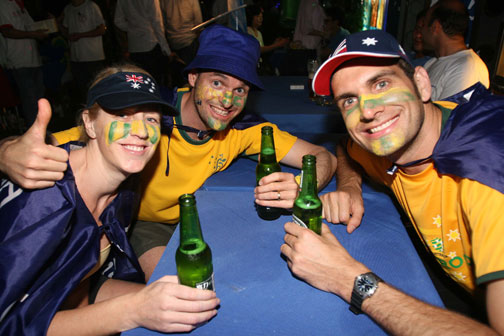Focus
Stout competition, fake hooch challenge imports
By Wang Chao And Todd Balazovic (China Daily)
Updated: 2010-06-02 07:50
 |
Large Medium Small |
|
|
Counterfeiting, the instability of major markets and competition from domestic beers are the biggest threats to survival for foreign beers in Beijing.
But even minor disruptions in markets such as Beijing, where even a recent police crackdown on prostitution in KTVs and other bars crimped alcohol sales, have hampered vendors.
Many bars have been closed since April, when the push against vice began.
Simon Pendergast, North China general manager for Dxcel, a distributor of imported wine and beer, noticed the change immediately.
"In April we had a cracking month, absolutely fantastic. It has been a little bit quiet in May. It's probably going to be down about 15 to 20 percent," Pendergast said.
But he said he expects to see sales fall in May because of the May Day holiday at the beginning of the month.
"People usually leave the city on vacation," he said.
However, he holds high expectations for the coming 2010 FIFA World Cup South Africa as sports fans belly up to the bar.
"The sales are to be huge during the World Cup," he said. "I've got beers from America, England, Spain, Australia. I've got quite a few World Cup countries covered there. Hopefully the beer from New Zealand is arriving in time."
He said he expects at a sales bump of at least 20 to 30 percent for the month.
"People will be out in numbers, bars will be running specials," he said. "In general, it's a great time to distribute and drink beer."
Garry Lu of the Carlsberg China Marketing Team said his company is used to market fluctuations and is therefore not so worried about the bar market.
"There are more bars and entertainment places than you can imagine," Lu said. "Those shut down are just part of those places, so there is little impact on our sales."
For years, Carlsberg, a Danish brewer, has tried to carve its own niche in the competitive Beijing market.
"I know Yanjing, Tsingtao and Snow are mainstream beers in Beijing and control all the restaurants and retail markets, so we have to find a new approach to expand our market."
Carlsberg targets expatriates, who have stronger consuming power and prefer to drink European beers.
Some Carlsberg beers are imported from France and the UK. Lu cited Kronenbourg 1664, a beer made in France, which has been existed since that year. The beer is normally sold for 40 yuan for a 500 ml bottle. In some high-end entertainment places or hotels, it is priced even higher.
Normally, a bottle of Yanjing sells for three or four yuan in stores, roughly one-tenth the price of a 1664.
"We know we cannot compete with the three giants in the mainstream market, so we are targeting high-end consumers," Lu said.
"To be honest, bars and entertainment places are more worried than us, since the hot season of summer and the World Cup is coming. If they remain closed they will lose out on serious business."
If the instability is an area brewers are managing to cope with, then counterfeiting is left as an even bigger headache for foreign brands in Beijing.
A former sales manager at a major brewery who refused to provide his name said it is difficult to find authentic imported alcohol in bars. The greed motive is strongest with costly bottled spirits, but is trickling down to the more modestly priced beers.
"It is the well-known secret in the (hospitality) industry: if you want to make money, don't sell authentic imported alcohol, especially wines," he said. "If a bottle is sold for 700 yuan, you can earn much more by adulterating it with some other alcohol, since nobody can tell the difference."
In 2007, an adulterated beer production workshop raided in Chaoyang was found with 7,000 cases of phony foreign beer.
Last year, a police squad handled about 15 cases related to the production of adulterated liquor, including beer, Chinese white wine and foreign wine.
Officers said fake foreign beers are sold to bars for about seven or eight yuan a bottle and sold to customers for 30 to 40 yuan a bottle.
He Liang, customer service manager of Babyface, which operates one of the largest bar chains in Chaoyang and other districts of the capital, estimated that about 100 bottles of foreign beers are sold every weekday in a single chain bar.
Zheng Tieqiu, who visits bars at least once every week, said: "I cannot tell the beer brand by taste. That's why I choose to buy foreign wine instead of beers."
Zheng said a substantial number foreign alcohol brands are not genuine.
